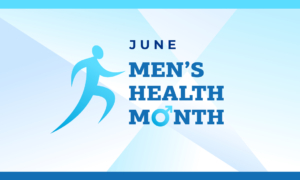With Father’s Day falling squarely in the middle of June, what better time to focus on the health of not only dads, but all the men in our lives? Since 1994, June has been designated as Men’s Health Month, a time to shine the spotlight on the many healthcare issues that affect men. And while men need to take care of themselves year-round, during June we can focus on those issues that affect men’s health in a unique way.
Despite increasing life expectancies across the board, men are still projected to live, on average, five fewer years than women. The CDC lists the most common causes of death for men as cancer, heart disease, and accidents. While we cannot safeguard against everything, good habits and lifestyle changes made today can protect men’s hearts and reduce their risk of cancer.
The Covid-19 pandemic revealed another alarming statistic: coronavirus death rates in 41 out of 47 countries were 2.4 times higher for men than women across all age groups. Researchers suspect that biological differences in men’s and women’s immune systems, combined with psychosocial and behavioral factors, may have played a role. One study noted that men tend to engage in more high-risk behaviors than women, putting them at greater risk of contracting the virus. They also have higher rates of tobacco use and alcohol consumption, behaviors linked with Covid-19 infection and death. Men are also less likely to comply with recommendations such as hand hygiene, social distancing, mask-wearing and seeking medical care.
As the pandemic wanes, these findings send an important message to men regarding their health and well-being. Obtaining regular check-ups with a healthcare provider can help ensure that men remain healthy. During the visit, men are encouraged to discuss the specific recommendations for them, based on their age, family history, lifestyle, risk factors, and underlying health issues. Some men may need to adjust their diets, or exercise more regularly. That may mean making changes as simple as replacing a processed snack with a fruit salad or taking the family dog for a walk. Others may find that it is time to schedule routine screening exams. Physicians may recommend screenings for prostate, colorectal and skin cancer, to name a few. Those at elevated risk may require more frequent screenings or may need to begin screening at a younger age than those at average risk.
Below are just a few of the recommended health screenings for men. Speak with your healthcare provider to determine the most appropriate schedule for you.
|
Complete physical |
Annually beginning at age 50; every 2 – 3 years before that |
|
EKG |
Baseline at age 30; annually beginning at age 50 |
|
Rectal exam |
Annually |
|
PSA Blood Test (screens for prostate cancer) |
Annually beginning at age 50 for those at average risk. Those at high risk, including African American men, should begin screening at age 40 |
|
Colorectal cancer |
Colonoscopy every 3 – 4 years beginning at age 50 for those at average risk |
|
Testicle, skin and breast self-exams |
Monthly to look for lumps or abnormalities |




